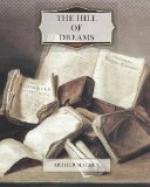“By woman wailing for her Demon lover.” The words were on his lips when he raised his eyes again. A broad band of pale clear light was shining into the room, and when he looked out of the window he saw the road all brightened by glittering pools of water, and as the last drops of the rain-storm starred these mirrors the sun sank into the wrack. Lucian gazed about him, perplexed, till his eyes fell on the clock above his empty hearth. He had been sitting, motionless, for nearly two hours without any sense of the passage of time, and without ceasing he had murmured those words as he dreamed an endless wonderful story. He experienced somewhat the sensations of Coleridge himself; strange, amazing, ineffable things seemed to have been presented to him, not in the form of the idea, but actually and materially, but he was less fortunate than Coleridge in that he could not, even vaguely, image to himself what he had seen. Yet when he searched his mind he knew that the consciousness of the room in which he sat had never left him; he had seen the thick darkness gather, and had heard the whirl of rain hissing through the air. Windows had been shut down with a crash, he had noted the pattering footsteps of people running to shelter, the landlady’s voice crying to some one to look at the rain coming in under the door. It was like peering into some old bituminous picture, one could see at last that the mere blackness resolved itself into the likeness of trees and rocks and travelers. And against this background of his room, and the storm, and the noises of the street, his vision stood out illuminated, he felt he had descended to the very depths, into the caverns that are hollowed beneath the soul. He tried vainly to record the history of his impressions; the symbols remained in his memory, but the meaning was all conjecture.
The next morning, when he awoke, he could scarcely understand or realize the bitter depression of the preceding day. He found it had all vanished away and had been succeeded by an intense exaltation. Afterwards, when at rare intervals he experienced the same strange possession of the consciousness, he found this to be the invariable result, the hour of vision was always succeeded by a feeling of delight, by sensations of brightened and intensified powers. On that bright December day after the storm he rose joyously, and set about the labor of the bureau with the assurance of success, almost with the hope of formidable difficulties to be overcome. He had long busied himself with those curious researches which Poe had indicated in the Philosophy of Composition, and many hours had been spent in analyzing the singular effects which may be produced by the sound and resonance of words. But he had been struck by the thought that in the finest literature there were more subtle tones than the loud and insistent music of “never more,” and he endeavored to find the secret of those pages and sentences which spoke, less directly,




